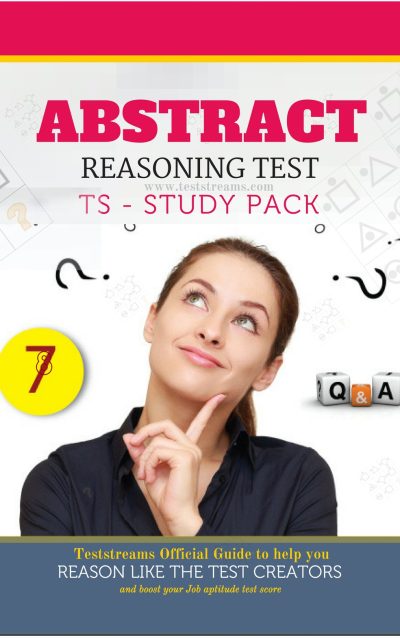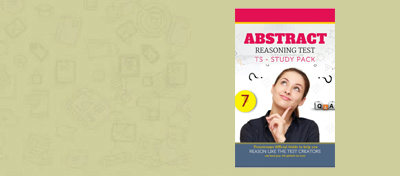Download Free Abstract Reasoning Apptitude Test Past Questions and Answers – Updated Version
Welcome to our Abstract Reasoning Aptitude Test Past Questions and Answers! In today’s competitive world, employers and educational institutions increasingly rely on abstract reasoning assessments to evaluate candidates’ cognitive abilities and problem-solving skills. As the demand for analytical thinkers and decision-makers rises, excelling in these tests has become more crucial than ever.
What is abstract reasoning?
Abstract reasoning tests are much alike to inductive reasoning and diagrammatic reasoning tests. They attempt to measure your lateral thinking and fluid intelligence with the objective of finding the accuracy and speed in which you can identify and interpret the relationship between a collection of shapes and patterns. Abstract reasoning tests are non-verbal tests and so these tests will not require you to analyse verbal or numerical information in the questions and answers.
Due to their similarity, we do not have abstract reasoning specific tests, instead the best way to practise this skill is with our bundle pack which will give you access to all tests including inductive, logical and diagrammatic which are the key tests to improve your abstract ability.
Sample Questions on Abstract Reasoning Aptitude Test
NUMERICAL REASONING
1: What is 25% of 120?
a) 30
b) 40
c) 50
d) 60
Answer: b) 40
2: If a shirt originally costs $60 and is discounted by 20%, what is the final price?
a) $42
b) $48
c) $50
d) $52
Answer: b) $48
3: Solve the following equation for ‘x’: 2x + 5 = 17
a) x = 6
b) x = 7
c) x = 8
d) x = 9
Answer: b) x = 7
4: A bakery sold 120 cupcakes in the morning and 80 cupcakes in the afternoon. How many cupcakes did they sell in total?
a) 100
b) 160
c) 180
d) 200
Answer: c) 180
5: If a car travels at a speed of 60 miles per hour, how far can it travel in 3 hours?
a) 120 miles
b) 140 miles
c) 160 miles
d) 180 miles
Answer: c) 160 miles
6: A box contains 24 red balls and 36 blue balls. What is the ratio of red balls to blue balls in the box?
a) 2:3
b) 3:2
c) 4:3
d) 3:4
Answer: b) 3:2
7: If a company’s revenue for the year was $500,000 and its expenses were $350,000, what was its profit for the year?
a) $100,000
b) $150,000
c) $200,000
d) $250,000
Answer: a) $100,000
VERBAL REASONING
1: Select the word that is most similar in meaning to “Ebullient.”
a) Gloomy
b) Cheerful
c) Calm
d) Timid
Answer: b) Cheerful
2: Choose the word that is opposite in meaning to “Extravagant.”
a) Wasteful
b) Lavish
c) Frugal
d) Generous
Answer: c) Frugal
3: In which sentence is the word “Elusive” used correctly?
a) The elusive butterfly was spotted in the garden yesterday.
b) The sunset was elusive, casting a beautiful glow over the horizon.
c) The elusive detective quickly solved the case.
d) The elusive musician performed an extraordinary concert last night.
Answer: a) The elusive butterfly was spotted in the garden yesterday.
4: Identify the correct spelling:
a) Accommodate
b) Acommodate
c) Accomodate
d) Acomodate
Answer: a) Accommodate
5: Which sentence is grammatically correct?
a) Neither the students nor the teacher was late for class.
b) Neither the students nor the teacher were late for class.
c) Neither the students nor the teacher is late for class.
d) Neither the students nor the teacher been late for class.
Answer: a) Neither the students nor the teacher was late for class.
6: Identify the antonym for “Eminent.”
a) Obscure
b) Renowned
c) Prominent
d) Distinguished
Answer: a) Obscure
7: Choose the correct word to complete the sentence:
She _________ the award for her outstanding performance in the play.
a) Receive
b) Received
c) Receives
d) Receiving
Answer: b) Received
LOGICAL REASONING
1: If all roses are flowers and some flowers are red, which of the following statements must be true?
a) All roses are red.
b) Some roses are red.
c) All red things are roses.
d) Some red things are flowers.
Answer: b) Some roses are red.
2: If all cats have whiskers and Fluffy is a cat, what can you conclude?
a) Fluffy has whiskers.
b) Fluffy does not have whiskers.
c) Fluffy is not a cat.
d) Fluffy is a dog.
Answer: a) Fluffy has whiskers.
3: Which number comes next in the series: 2, 4, 8, 16, __ ?
a) 24
b) 32
c) 64
d) 128
Answer: c) 64
4: If all birds have feathers and some birds can fly, which of the following statements must be true?
a) All birds can fly.
b) No birds can fly.
c) Some things that can fly are birds.
d) Some things that have feathers are not birds.
Answer: c) Some things that can fly are birds.
5: If today is Wednesday, what day of the week will it be two days after the day before yesterday?
a) Monday
b) Tuesday
c) Wednesday
d) Thursday
Answer: d) Thursday
6: If all apples are fruits and some fruits are oranges, which of the following statements must be true?
a) All oranges are apples.
b) Some oranges are apples.
c) All fruits are oranges.
d) Some oranges are fruits.
Answer: d) Some oranges are fruits.
7: If John is taller than Bob, and Bob is taller than Mike, who is the tallest?
a) John
b) Bob
c) Mike
d) Insufficient information to determine
Answer: d) Insufficient information to determine

Abstract Reasoning Test Questions


![Kwara State Civil Service Promotion Exams Past Questions and Answers [Free – PDF Download] Kwara State Civil Service Promotion Exams Past Questions and Answers [Free – PDF Download]](https://teststreams.com/blog/wp-content/uploads/2023/08/ekiti.jpg)

